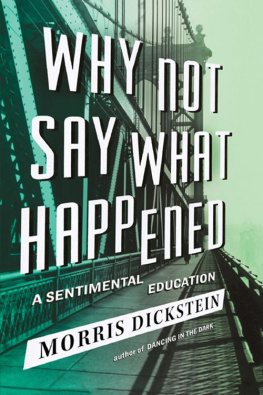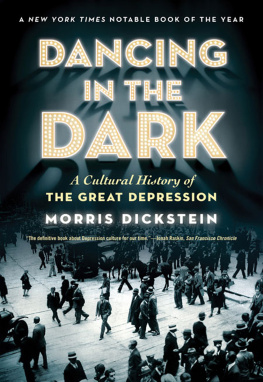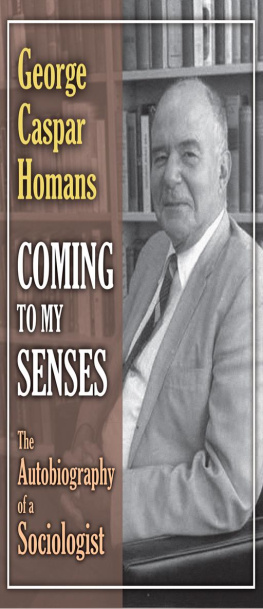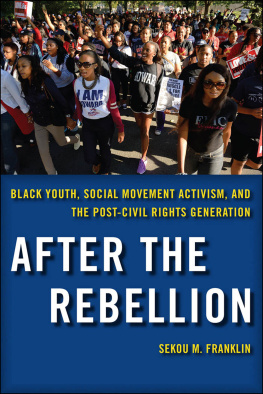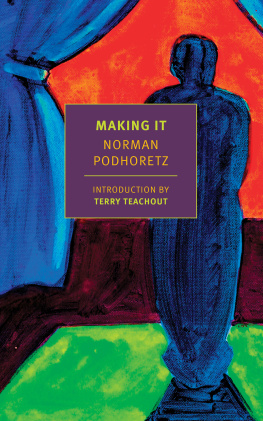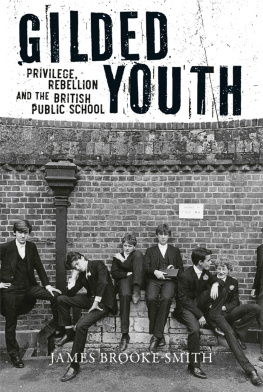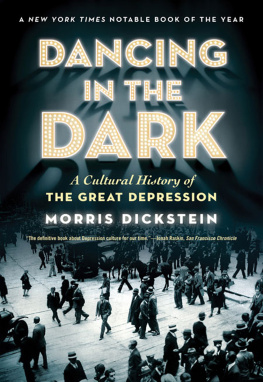WHY NOT
SAY WHAT
HAPPENED
A Sentimental Education

MORRIS DICKSTEIN

LIVERIGHT PUBLISHING CORPORATION
A Division of W. W. Norton & Company
New York London

The boy in the sailor suit, who could not save his grandmother from dying, 1942.
For Lore
with love always
Contents

To knock at the door of the past was in a word to see it open to me quite wide.
HENRY JAMES, A Small Boy and Others
The past is a foreign country: they do things differently there.
L. P. HARTLEY, The Go-Between
T HIS IS a ghost story, though I dont believe in ghosts. These pages are haunted by people long gone, including earlier versions of myself. Sometimes theyve come back unbidden, like uninvited guests. More often I conjured them up to fill out the story of who I was, where I had been, whom I had known. Why not say what happened? wrote Robert Lowell in one of his last poems, Epilogue, appealing simply for the grace of accuracy. We ourselves are tissues of memory, our recollections interwoven with our hopes and fears, desires and disappointments. When Ive actually revisited places I once lived, such as New Yorks Lower East Side, powerful feelings spontaneously welled up. Ive found myself drawn with burning curiosity even to scenes I had been eager to escape. Or else I would shuffle my memories like a pack of cards, feeling tiny spasms of pleasure, regret, or astonishment. Was that really me in that little drama? Did I actually say that, do that? Was I ever that smart, that fresh, that obtuse, that unforeseeing? How did I survive that one? Yet I never wanted to break off these encounters, to shout warnings at the movie screen, like Delmore Schwartz in his story In Dreams Begin Responsibilities as he watches the reel unfold of his mismatched parents courtship. He stands up to admonish them never to marry, never to bring him forth. What an ambition, never to have been born!
There was a moment in 1966 when I came to realize how much past experiences resonated for me. My wife and I, still newlyweds, were living in New Haven during my last year as a graduate student in English at Yale. We had a modest ground-floor apartment on Beers Street, half a block from St. Raphaels Hospital, not more than five or six blocks from where I lived when I first came to town five years earlier. In 1961 Id left my native city but brought my native customs with me. I had grown up in an Orthodox Jewish family in New York, where keeping the faith was an easy matter since everyone around me did much the same. Though I had by then left much of my religious observance behind, I needed an apartment I could share with roommates who, like me, would keep a kosher kitchen. The freedom, even the impulse, to break with this commitment was well beyond me; the attachments of a lifetime kept me in the fold. Luckily, two advanced graduate students in chemistry, also Jewish, also lightly religious, advertised for a third to share the rent, and I moved in with them. They were good fellows both, Marcel and Eli, agreeable and easy to live with, though apart from religion we had little in common.
I spent the first two years after college in that furnished flat at 98 Sherman Avenue, wrestling with my courses, working at assignments that kept me as busy as Id ever been in my life. It was hardly a garret, but it was nestled under the eaves of a typical three-story New Haven frame house: three bedrooms, sparsely furnished, with a long hall that connected them to a small dining room and an even smaller kitchen in the rear. It was the first apartment Id ever had and, spare as it was, I was thrilled to be on my own. The house was an easy mile from the Yale campus and even closer to a synagogue that had recently established a kosher kitchen providing dinners for a small group of Yale students several evenings a week.
So long as I kept the faith, even minimally, my years on Sherman Avenue were like going away without really leaving home. Reading and writing under fierce academic pressure, a regimen I loathed, I managed to get a world-class education in English literature on top of the less professional one Id enjoyed as an undergraduate. In this apartment I finally lost my virginity one hot night in October 1962, not in my own messy and cramped bedroom, piled high with books and papers, but on neutral ground, the neatly made bed of one of my absent roommates. I had fallen in love with a woman I had met a few months earlier on a boat ride to Bear Mountain to celebrate Elis coming nuptials. Two and a half years later, after many complications, including a year abroad, I married her.
So here we were, for a time the only tenants in our house on Beers Street. The neighborhood, the block, was rapidly turning black, and our landlord, a Korean, at first refused to rent to black people. My new wife would bike to work at Yales biology department while I dithered on my thesis, trying at once to write and not to write it. My old student digs on Sherman Avenue were not far away but out of my usual orbit, almost forgotten. One day in 1966 I was out for a walk and happened to pass the building, which I hadnt seen in years. To my surprise, my consternation, it looked altogether deserted. Neither the ground-floor flat nor the landlords place above it looked inhabited. I was distressed to think the building was empty, as if part of my old life had been hollowed out, never to be recovered. Perhaps the house was to be torn down, a rarity in New Haven, an economically depressed town where little changed from decade to decade. The place had the sad look of an abandoned house but to me it offered an irresistible temptation. What was happening there? Where had those years gone? I was growing agitated; my limbs were trembling slightly. I had been close to miserable the years I lived there but for some reason I had to see the place again.
I walked up a flight of stairs that felt familiar yet strangely unfamiliar, like an uncanny apparition. I knocked on what had been the landlords door though no name was posted on it, but there was no sign of life. I went up another ghostly flight and tapped on the door of the old flat, though I had no idea of what to say when someone opened it: I once lived here? Im a graduate of this building? For reasons I cant explain, I desperately need to see this apartment again? None of this made the least sense. When there was no answer to my third knock, I tried the door and it swung open. Folks often did not lock their houses thenthose were halcyon timesbut they certainly locked their apartments. Without quite intending to, I hesitantly walked in, assuming the flat was deserted. Soon it was clear that people were living there, and this annoyed me no end. What were they doing in my old haunts? A moment later it also offended me. What right did they have to be there? I looked into Marcels old room, immediately to my left, and saw a huge pyramid of empty beer cans stacked up against the wall, like junk sculpturenot at all the way three good Jewish boys had been living. And the scale was off; the apartment seemed much smaller than the one I remembered. It must have expanded in my mind as it receded in time, though scarcely three years had passed since I had been living there.
Everything seemed subtly askew, a touch hallucinatory, like the stylized sets in
Next page
